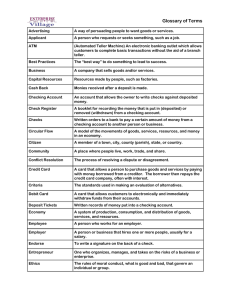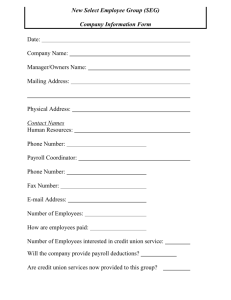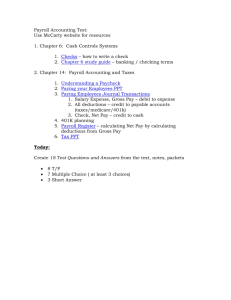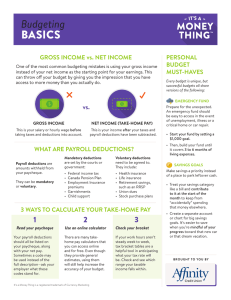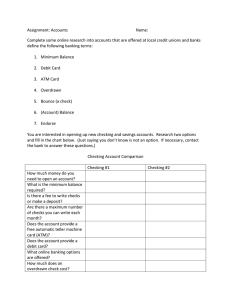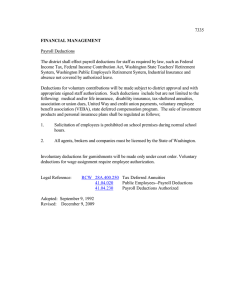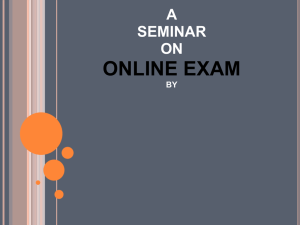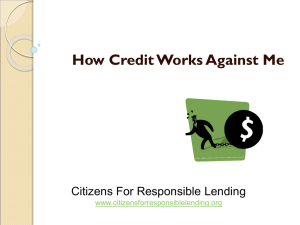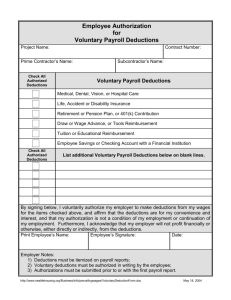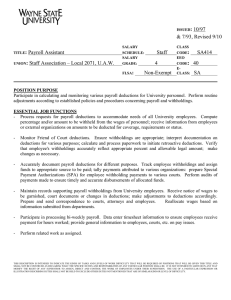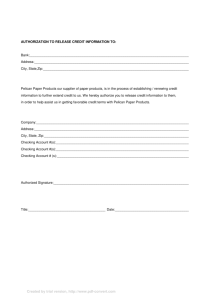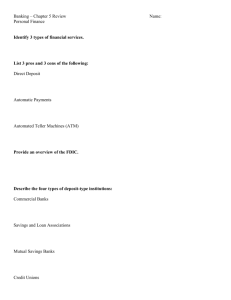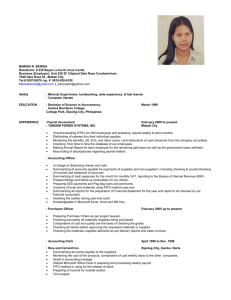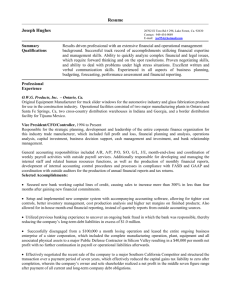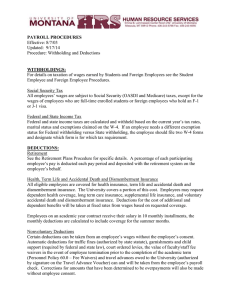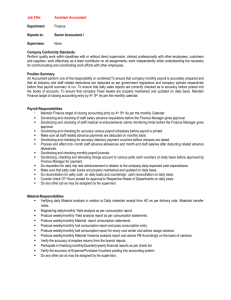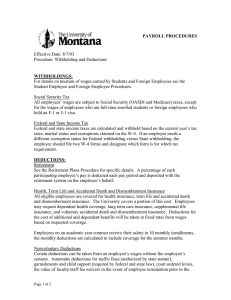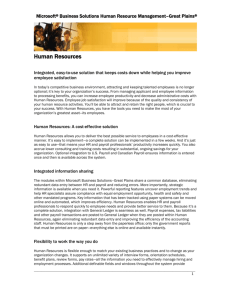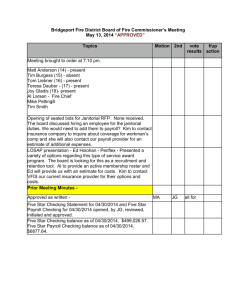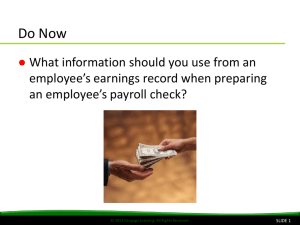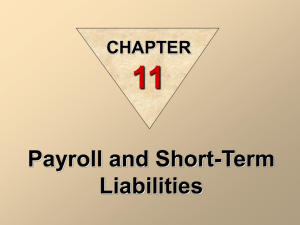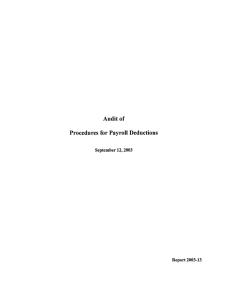JA BizTown™ Vocabulary
advertisement
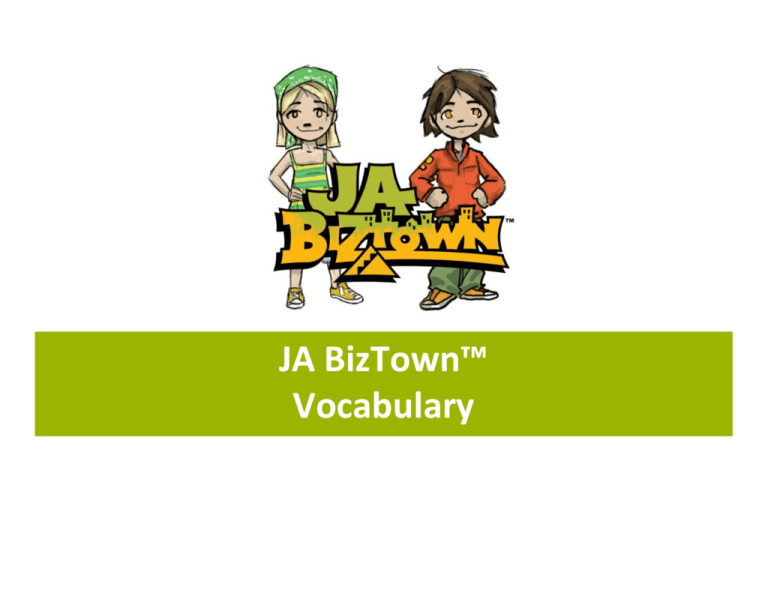
JA BizTown™ Vocabulary Unit 1 Community and Economy Citizen A member of a town, city, country, state or country. Community A place where people live, work, trade and share. Trade Exchange of goods and services, usually for money. Business A company that sells goods and/or services. Right The ability to act in a certain way. Responsibility A duty. Economy A system of production, consumption, and distribution of goods, services, and resources. Resources Things and people used to produce goods and services. Human Resources The skills and abilities of workers used in production. Natural Resources Things used in production that occur naturally in the world, such as water. Capital Resources Resources made by people, such as factories. Market A system in which people and businesses buy and sell goods, services, and resources. Circular Flow A model of the movements of goods, services, resources, and money in an economy. Prototype A model or sample of product to be produced. Scarcity A situation in which people can’t have everything they want because of limited resources. Free Enterprise A system in which economic decisions are made in markets by people and businesses, with little government influence. Profit They money that is left over after a business pays all its costs. Public Goods and Services Goods and services that provide benefits to many people, but people may not be restricted from using them. Taxes Required payments to government. Philanthropy The effort to increase the well-being of people through charitable giving. Nonprofit Organizations Institutions developed to increase the well-being of others in certain areas, such as education, religion, health, and other causes. Opportunity Costs The value of the next best alternative given up when a choice is made. Unit 2 Financial Literacy Financial Institution A business that provides moneyrelated services. Checking Account An account that allows the owner to write checks against deposited money. Debit Card Cards that allow customers to electronically and immediately withdraw funds from their accounts. Savings Account An account used to hold money that is not needed right away. Loan An amount of money borrowed by someone that must be repaid, usually with interest. Interest A fee received for the use of money. 5% 15% 10% Credit Card A card that allows the holder to buy goods and services, taking out a bank loan for the purchases. Checks Written orders to a bank to pay a certain amount of money from a checking account to another person or business. Deposit Tickets Written records of money put into a checking account. Check Register A booklet for recording the money that is put in (deposited) or removed (withdrawn) from the checking account. Net Deposit The amount of money deposited into an account, minus any cash received. Endorse To write a signature on the back of a check. Compound Interest The interest a person earns on today’s money that will compound (add) to the amount of money (savings) that will earn interest later. Unit 3 Work-Readiness Interests Things a person likes to do. Skills Developed abilities a person does well. Employer A person or business that hires one or more people, usually for a salary. Employee A person who works for an employer. Soft Skills Skills that represent the way employees act on the job, such as being punctual, treating customers with kindness, working as a team, and dressing appropriately. Teamwork The cooperative efforts by members of a group to achieve the same overall goal. Negotiation The process of two or more people, who may disagree at first, working together to solve a problem. Conflict Resolution The process of resolving a dispute or disagreement. Innovative Solutions Creative ideas for solving problems that are put to use. Entrepreneur An innovator; one who recognizes opportunities and organizes resources to take advantage of them. Job Application A form that is completed by people applying for a job. Resume A summary of a person’s work and school experiences to help employers hire the best person for a job. Ethics The standards that help determine what is good, right and proper. Job Interview A discussion (usually face-to-face) to determine whether an applicant is suitable for a job. Applicant A person who requests or seeks something such as a job. Pay Stub The part of a paycheck that is retained by the employee as a record of pay and payroll deductions. Gross Pay The amount an employee has earned before any taxes or other deductions are subtracted. Payroll Tax A tax on an employee’s pay. Net Pay Gross pay minus any taxes and other payroll deductions. Unit 4 Business Management Ranking The process of putting things into a position on an ordinal scale in relation to others. Criteria The standards used in making an evaluation of alternatives. Revenue Price times the quantity sold. Best Practices The “best ways” to do something to lead to success. Quality Business A business that tries to meet its customers’ needs through a process of continuous improvements. Job Responsibilities The specific tasks and duties associated with a particular job. Promissory Note A promise to repay a loan within a certain time period. Selling Price The amount of money a buyer pays and a seller receives for the purchase of a unit of a good or service. Inventory Goods that a business has in stock to sell. Advertising A way of persuading people to want goods or services. Internship A short-term, career-related work experience for students, with or without pay. Job-Shadow A follow a worker who is performing job duties.
